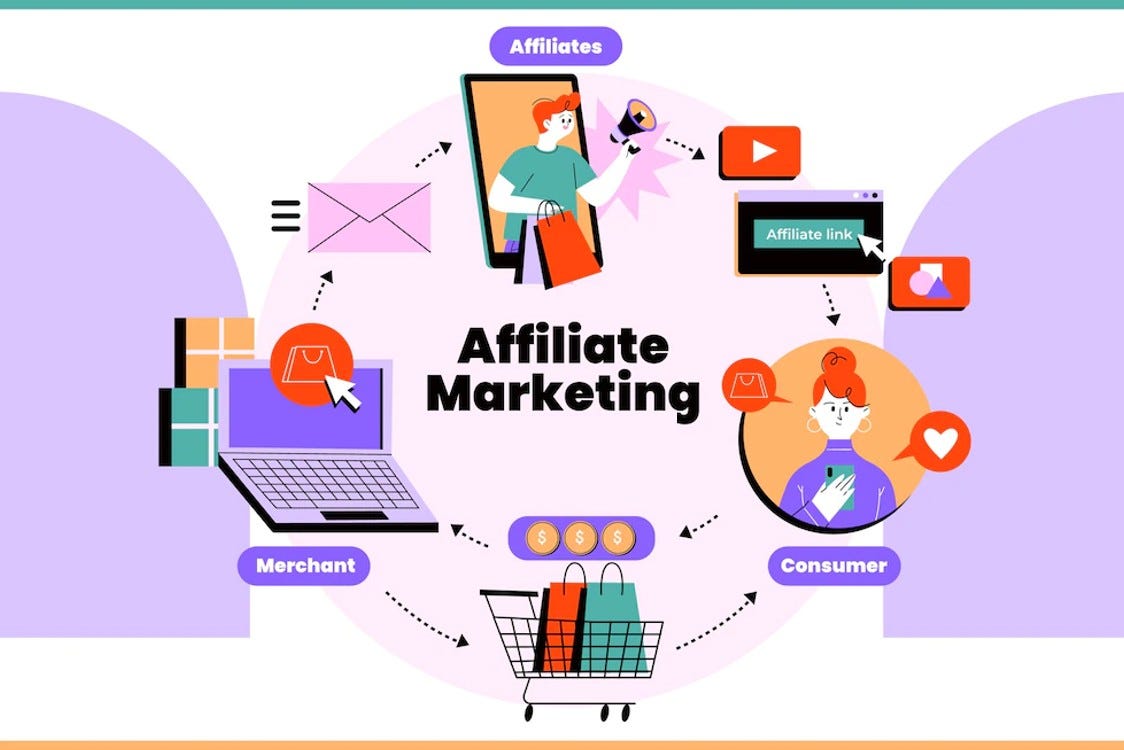Affiliate marketing has long been a cornerstone of digital marketing, allowing businesses to expand their reach and generate sales through partnerships with affiliates. As technology and consumer behavior continue to evolve, so does the affiliate marketing landscape. This blog explores the future of affiliate marketing, highlighting emerging trends and technologies that are set to shape the industry.
The Evolution of Affiliate Marketing

Early Days: Simple Referral Programs
Affiliate marketing began with basic referral programs, where businesses paid commissions for leads or sales generated through affiliates. These straightforward programs focused on direct referrals without sophisticated tracking or analytics.
Rise of Performance Marketing
As digital marketing matured, affiliate marketing evolved into a more performance-driven model. Advanced tracking technologies and analytics allow for better measurement of affiliate contributions, leading to more strategic partnerships and optimization of marketing efforts.
Current Landscape: Diverse Strategies
Affiliate marketing encompasses various strategies, from content marketing and SEO to influencer partnerships and social media campaigns. The focus is on creating value-driven content and building authentic relationships with audiences.
Key Trends Shaping the Future of Affiliate Marketing
AI and Machine Learning Integration
Artificial intelligence (AI) and machine learning revolutionize affiliate marketing by enabling more precise targeting and personalization. These technologies can analyze vast amounts of data to identify patterns and predict consumer behavior, allowing marketers to optimize their campaigns for better performance.
Example:
AI-powered tools can recommend the best products for affiliates to promote based on their audience’s preferences and purchasing history, increasing the likelihood of conversions.
Influencer Partnerships
Influencer marketing is becoming increasingly intertwined with affiliate marketing. Influencers have built trust with their audiences, making them ideal partners for promoting products and services. Future trends indicate a deeper integration of influencer partnerships within affiliate programs, leveraging their reach and credibility to drive sales.
Example:
Brands may collaborate with micro-influencers to target niche markets more effectively, as these influencers often have highly engaged and loyal followers.
Enhanced Tracking and Analytics
Advanced tracking and analytics tools are essential for the future of affiliate marketing. These tools provide detailed insights into the performance of affiliate campaigns, helping marketers understand which strategies are most effective and where improvements are needed.
Example:
Using blockchain technology for transparent and secure affiliate transaction tracking ensures accurate attribution and fair compensation.
Growth of Niche Markets
The future of affiliate marketing will see a rise in niche markets as consumers seek more personalized and specialized products. Affiliates who cater to specific interests and communities will have a competitive edge, providing tailored content and product recommendations.
Example:
Affiliate marketers focusing on sustainable and eco-friendly products can tap into the growing demand for environmentally conscious consumer goods.
Mobile-First Approach
With the increasing use of mobile devices, affiliate marketing strategies must prioritize mobile optimization. Mobile-friendly content, apps, and seamless user experiences are crucial for capturing the attention of on-the-go consumers.
Example:
Developing mobile-specific campaigns and utilizing mobile app tracking to monitor user engagement and conversions.
Video Content and Live Streaming
Video content and live streaming are gaining traction as powerful tools for affiliate marketing. These formats allow for dynamic and engaging product demonstrations, tutorials, and real-time audience interactions.
Example:
Leveraging platforms like YouTube and Instagram Live for live product reviews and Q&A sessions, driving real-time engagement and sales.
Ethical and Transparent Practices
As consumers become more aware of privacy and ethical considerations, transparency in affiliate marketing practices will be paramount. Building trust through honest and transparent marketing strategies will be essential for long-term success.
Example:
Clearly disclosing affiliate partnerships and ensuring compliance with regulations such as the General Data Protection Regulation (GDPR) and Federal Trade Commission (FTC) guidelines.

The future of affiliate marketing is bright and full of opportunities, driven by technological advancements and consumer behavior shifts. Marketers can stay ahead in this dynamic industry by embracing AI, leveraging influencer partnerships, focusing on niche markets, and prioritizing mobile and video content. Ethical and transparent practices will continue to build trust and credibility, ensuring sustainable success. As the landscape evolves, staying informed and adaptable will be key to thriving in the ever-changing world of affiliate marketing.







